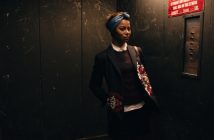
Editor’s Notes: The following article is part of our coverage of the Locarno International Film Festival. For more information on the festival visit pardolive.ch and follow the Locarno International Film Festival on Twitter at @FilmFestLocarno.
It’s a sorry state of affairs when film festival dispatches have to be held off for a three-in-one package just to have enough movies to fill up a post. But then didn’t I tell you my Locarno experience would be vastly back-loaded? It’s only today that things out to kick into a higher gear, as other business gives way to watching and watching and watching and watching and watching some more. Daily updates will—should, must—follow from here; until then, days three through five:
How fittingly icy an antidote to the annoying absurdity of Wrong Cops’ humour Exhibition turned out to be: Joanna Hogg’s latest is a fixating and often frustrating examination of the performance of everyday life, caught through the lens of a couple-on-the-rocks fearfully anticipating the sale of their luxurious London home. Hogg’s direction utilises the unique space beautifully, visually expressing what her characters only wish they could say. Her writing is less satisfying, and the drawback that prevents Exhibition from becoming the great movie it might have been. See my full review for more.
Lighter fare followed in the form of Claire Simon’s Gare du Nord, a romantic dramedy set in the eponymous Parisian train station, and happily using its multitudinous points of human convergence as a handy stand-in for the ephemeral nature of communication and connection. Simon’s is a lively script, shot through with excellent wit and delivered by a host of faces as apt in raising a laugh as they are inviting a sad smile. Nicole Garcia’s Mathilde is the heart of the ensemble: a middle-aged professor whose deep sadness is gradually and gracefully pulled back, she maintains the underlying humanity of the comedy as it segues off, here and there, into slightness. That’s a sensation not helped by the movie’s closing act, wherein Simon’s erstwhile efficiency in blending tonally disparate subplots loses its way, and the film starts to feel less a cohesive whole than several smaller, less-significant shorts cobbled together. While a far cry from disaster, this is an unfortunate parting glance at a piece of work that seemed so much stronger; Gare du Nord is better, and more deserving, than its bad ending makes it seem.

Of course, the real draw of the film festival environment is its preservation of the traditional incarnation of cinema: the theatrical experience, boosted here by full-house crowds, makes it much easier to appreciate how the movie is playing with the audience as a whole. It proved particularly useful in the case of Our Sunhi, the latest from celebrated Korean director Hong Sang-soo. In the past I’ve been blind to the allure of Hong’s movies, the bulk of their alleged comedy lost on me. It was as much the communal experience, I suspect, as the consensus that this newest effort is among his funniest that made me see light with Our Sunhi. Though not a blinding amount, as my full review strives to explain.
A particularly bustling Saturday made, after all other commitments—recuperation among them—were seen to, for an unforgivably mere one movie day. At least that movie was my most anticipated of the festival: When Evening Falls on Bucharest or Metabolism, the bulkily titled latest from 12:08 East of Bucharest and Police, Adjective mastermind Corneliu Porumboiu. The mouthful is appropriate: the new movie is an incredibly dry satire on artistic ego inflation, its film director main character an interesting self-cipher of sorts that allows Porumboiu to step back and look at the excesses of the Romanian New Wave he helped build, all the while engaging in a serious dialogue about the state of modern cinema. Here’s one a capsule can’t hope to serve: more to follow.
Sunday saw better fortunes on the film-viewing front, starting with the exceptionally odd documentary Barbaric Land, which made for as trying an early-morning viewing as I’ve had here. Opening with a five-minute reel of silent archival footage of Mussolini’s funeral, Yervant Gianikian and Angela Ricci Lucchi’s film exclusively and extensively employs extant imagery to explore the African legacy of Il Duce, particularly with regard to the atrocities committed in Ethiopia. It’s an airy, ethereal affair, at times undone by the bizarre singing of one of the directors, who repeats whispered narration in awfully out-of-tune song. Yet somehow it all sort of works within the oppressive atmosphere the documentary constructs: harrowing shots of starved horses act as obvious ciphers for the death we cannot see; images of nude natives leered at by soldiers suggests a cultural rape as much as unthinkably many in the literal sense. Barbaric Land may collapse here and there under the weight of its own oddity, but it’s an undeniably powerful, perturbing experience to behold, an important rendition of a great crime all-but lost to the annals of history.
It’s safe to say, given the standing ovation that started the second the end credits began and lasted long after they’d concluded, that Short Term 12 may be the popular hit at Locarno this year. It’s also safe to say that’s entirely deserved: Destin Cretton’s movie is a dark delight, masterfully balancing its macabre drama with a sharp sense of humanistic humour. What’s wonderful is how its crowd-pleading qualities are not the consequence of design; Cretton and his cast employ no cloying sentimentality to draw their audience in, only the true experience of life’s ups and downs. Nothing could be more pleasing: see my fuller, more flattering review for more.
Closing the day and the first week of Locarno was Gabrielle, a fluffy French-Canadian quasi-musical comedy. Its eponymous heroine—a 22-year old set on independence despite her developmental disorder—and her choir are the focus as they prepare for an upcoming music festival concert. Louise Archambault’s film is light, even slight, its gentle humour and surface-skimming drama making for an affable enough experience, if rather an unmemorable one. Its strength is in the romance it crafts between Gabrielle and fellow singer Martin: leads Gabrielle Marion-Rivard and Alexandre Landry build vastly upon Archambault’s script, making of their characters’ romance something equally personal and political. The latter aspect shouldn’t be overemphasised: there’s a touch of social concern to Gabrielle, but it’s basic at best, more a feature of the film’s populist sensibilities than any sort of progressive intent. In that respect, it’s an appropriate movie to close out a wearying week: its simplicity may be—at least in part—its weakness, but it’s also a peculiar part of its unassuming appeal.



